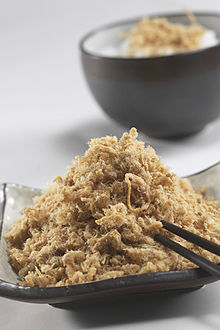Meat floss
Rousong
 |
| Alternative names |
meat wool, meat floss, pork floss, flossy pork or pork sung |
| Place of origin |
China |
| Main ingredients |
Pork |
 |
Rousong (pronounced [ɻôusʊ́ŋ]; Chinese: 肉鬆; Cantonese Yale: yuk6 sung1), also known as meat wool, meat floss, pork floss, flossy pork, pork sung or yuk sung, is a dried meat product with a light and fluffy texture similar to coarse cotton, originating from China.Rousong is used as a topping for many foods, such as congee, tofu, and savoury soy milk. It is also used as filling for various buns and pastries, and as a snack food on its own. Rousong is a very popular food item in Chinese cuisine.
Rousong is made by stewing cuts of pork in a sweetened soy sauce mixture until individual muscle fibres can be easily torn apart with a fork. This happens when the water-insoluble collagen that holds the muscle fibres of the meat together has been converted into water-soluble gelatine. The meat is teased apart, strained, and partially dried in the oven. It is then mashed and beaten while being dry-cooked in a large wok until it is nearly completely dry. Additional flavourings are usually added while the mixture is being dry-fried. Five kilograms of meat will usually yield about one kilogram of floss.
Fish can also be made into floss (; yú sōng), though initial stewing is not required due to the low collagen and elastin content of fish meat.
In Muslim majority Indonesia, beef floss is the most popular variant, and meat floss is commonly called abon. Malaysian Muslims make and consume meat floss made from chicken or beef called serunding, which is a popular delicacy during Ramadan and Eid al-Fitr.
...
Wikipedia

